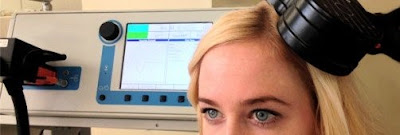Newswise, February 15, 2017 — CHICAGO - Northwestern Medicine
scientists showed for the first time that non-invasive brain stimulation can be
used like a scalpel, rather than like a hammer, to cause a specific improvement
in precise memory.
Precise memory, rather than general memory, is critical for
knowing details such as the specific color, shape and location of a building
you are looking for, rather than simply knowing the part of town it’s in.
This type of memory is crucial for normal functioning, and it
is often lost in people with serious memory disorders.
“We show that it is possible to target the portion of the
brain responsible for this type of memory and to improve it,” said lead author
Joel Voss, assistant professor of medical social sciences at
Northwestern University Feinberg School of Medicine.
“People with brain injuries have problems with precise memory
as do individuals with dementia, and so our findings could be useful in
developing new treatments for these conditions.”
Red highlights the "core" of the memory network.
" Blue indicates where electromagnetic pulses were applied.
By stimulating the brain network responsible for spatial
memory with powerful electromagnets, scientists improved the precision of
people's memory for identifying locations.
This benefit lasted a full 24 hours after receiving
stimulation and corresponded to changes in brain activity.
“We improved people’s memory in a very specific and important
way a full day after we stimulated their brains,” Voss said.
The paper was published Jan. 19 in Current Biology.
The research enhances scientific understanding of how memory
can be improved using noninvasive stimulation. Most previous studies of
noninvasive brain stimulation have found only very general and short-lived
effects on thinking abilities, rather than highly specific and long-lasting
effects on an ability such as precise memory.
The memory test that showed improvements due to
stimulation.
Subjects studied ~100 objects, each at specific screen
location, and were tested for their ability to recall these locations
after a delay.The scientists used MRI to identify memory-related brain networks
then stimulated them with noninvasive electromagnetic stimulation.
Detailed memory tests were used to show that this improved spatial precision
memory, and EEG was used to show that these memory improvements corresponded to
indicators of improved brain network function.
Other Northwestern authors include first author Aneesha S.
Nilakantan, Donna J. Bridge, Elise P. Gagnon and Stephen A. VanHaerents.
The research was supported by grants P50-MH094263,
R01-MH106512, and R01-MH111790 from the National Institute of Mental Health,
T32-AG20506 from the National Institute on Aging and F32-NS087885 from the
National Institute of Neurological Disorders and Stroke, all of the National
Institutes of Health.

No comments:
Post a Comment